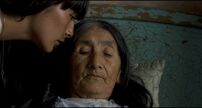In Peru's horrific times when various rebels coexisted, women who were raped by thugs would suffer from a strange disease, and these women would secrete "milk of sadness" to pass on to their children. The heroine Fasta is such a girl who is fed by "sad milk". Although the horror period has ended, the inherited disease "fear" has not been eliminated, which not only blocks her contact with the outside world, but also saves her life. She left an unspeakable secret—in order to prevent the invasion, she stuffed a potato into her private part...
With the previous annotations, watching the movie was much smoother, and there were no complicated equations to solve. Just revolving around Fasta's mental journey, experience the feeling of seeing people heal. Those who can save themselves are heroes, and those who muster up the courage to save themselves are also strong.
The entire film has been suppressing your sensory cells with an unstretchable tension. The face of Fasta (Margaret Solier), which has a very individual character, is not decorated with powder, and is placed directly in front of the camera, covering the entire face. The whole picture is full of sorrow, fear and helplessness, and the visual discomfort suddenly set off a huge wave in my heart. A few times, I said to myself, "I don't want to watch it." Of course, there will be an episode everywhere, and it's good to go.
The entanglement between Fasta and the female musician may be a conflict between morality and material interests. Inspiration-drying, but not terrified, female musicians end up taking advantage of Fasta and then ruthlessly abandoning her. People who genuinely care about the underdog seem to be as precious as rare animals on the verge of extinction, and Fasta bumps into one, but in disguise. Fortunately, the director was fair. She at least compensated Fasta for pearls that could be used to bury her mother.
Poor Fasta finally found the sea where his secrets could be at ease, a sea as open as a heart.
Supplementary opinion: In addition to raising concerns, you can get a glimpse of the life in some remote areas in South Africa, and see the ordinary people living in poverty and happiness in the local area, which is also a kind of learning. The movie is okay, but it seems a bit overrated with the Golden Bear Award, personally I feel.
View more about La teta asustada reviews









